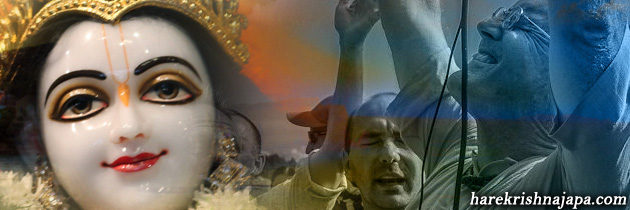04 The meaning of the name “Rama”

"Rama" means spiritual enjoyment:
Those who are actually yogis truly enjoy, but how do they enjoy? Ramante yogino 'nante−their enjoyment is unlimited, that unlimited enjoyment is real happiness, and such happiness is spiritual, not material. This is the real meaning of Rama, as in the chant Hare Rama. Rama means enjoyment through spiritual life. Spiritual life is all pleasure, and Krsna is all pleasure.
– The Perfection of Yoga
"Hare Rama" refers both to Sri Balarama and Lord Ramacandra:
We may mention an incident that took place between two of our sannyasis while we were preaching the Hare Krsna maha−mantra in Hyderabad. One of them stated that "Hare Rama" refers to Sri Balarama, and the other protested that "Hare Rama" means Lord Rama. Ultimately the controversy came to me, and I gave the decision that if someone says that "Rama" in "Hare Rama" is Lord Ramacandra and someone else says that the "Rama" in "Hare Rama" is Sri Balarama, both are correct because there is no difference between Sri Balarama and Lord Rama.… Those who are aware of the visnu−tattva do not fight over all these details.
– Sri Caitanya caritamrta Adi lila 5.132
[Lord Krsna to Yogamaya]: The son of Rohini will also be celebrated as Sankarsana because of being sent from the womb of Devaki to the womb of Rohini. He will be called Rama because of His ability to please all the inhabitants of Gokula, and He will be known as Balabhadra because of His extensive physical strength.
These are some of the reasons why Balarama is known as Sankarsana, Balarama or sometimes Rama. In the maha−mantra
Hare Krsna Hare Krsna Krsna Krsna Hare Hare
Hare Rama Hare Rama Rama Rama Hare Hare
people sometimes object when Rama is accepted as Balarama. But although devotees of Lord Rama may object, they should know that there is no difference between Balarama and Lord Rama. Here Srimad−Bhagavatam clearly states that Balarama is also known as Rama (rameti). Therefore, it is not artificial or us to speak of Lord Balarama as Lord Rama. Jayadeva Gosvami also speaks of three Ramas: Parasurama, Raghupati Rama and Balarama. All of them are Ramas.
– Srimad Bhagavatam 10.2.13
The word "Rama" refers both to Lord Balarama and to Lord Nityananda:
In the maha−mantra
Hare Krsna Hare Krsna Krsna Krsna Hare Hare
Hare Rama Hare Rama Rama Rama Hare Hare
refers to Balarama. Since Nityananda is an expansion of Balarama, Rama also refers to Lord Nityananda. Thus Hare Krsna, Hare Rama addresses not only Krsna and Balarama but Lord Caitanya and Nityananda as well.
– Sri Caitanya caritamrta Adi lila Intro.





